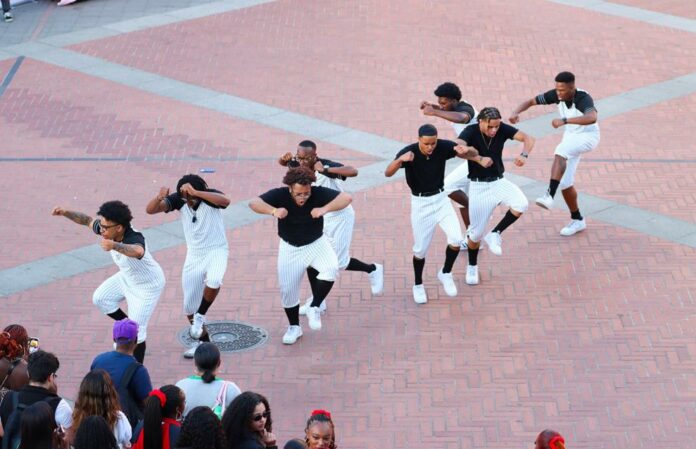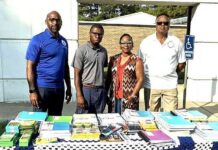
If you were near Upper Sproul on Friday night, the Divine 9’s yardshow was hard to miss.
A performance meant to celebrate Black community and culture, the Black Greek fraternities and sororities of the UC Berkeley National Pan-Hellenic Council made Upper Sproul their stage, drawing generations of Black UC Berkeley students, alumni and community members, and fraternity and sorority members from UC Davis, San Jose State, San Francisco State and more.
Every fraternity and sorority had their own chants, calls and strolls that came from a long line of tradition, each one with their own distinct personalities.
“Growing up, a lot of the brothers of my fraternity helped raise me to become the man I am today,” said Steven Jones, a member of Kappa Alpha Psi, who performed in the yardshow. “Doing this and being able to give back and put on performances for the Black community, at predominantly white institutions has been crazy.”
Between the strolls and dances, each group put on their own flare; A member from Phi Beta Sigma launched himself over his brother’s shoulders, members from Kappa Alpha Psi threw roses around girls and a Sigma Gamma Rho sister hit a baseball that exploded into a blue cloud.
Many of the groups advocated for voting in the upcoming Nov. 5 election. In addition, the Alpha Phi Alpha fraternity dressed in baseball uniforms to recall the Negro League Baseball, which formed in 1920 when National League Baseball refused to allow Black players in.
According to financial secretary Ayinde Hamilton, ingraining a theme into the performance allowed them to showcase something that “would have gone over people’s heads” if presented in another way.
Jones said the yardshow also helps keep Black culture alive on campus.
Generations of prophytes, or alumni, came back to support. The crowd was filled with parents and grandparents who came to support sons, daughters, nieces and nephews who joined the same sorority or fraternity as they did.
Autumn Anderson, a Alpha Kappa Alpha alumni who graduated in 2007, has a daughter in the same sorority as her. To see the legacy still persevering, she noted, was “incredible.”
Jones, who graduated this summer, and Anderson both noticed the impact of the end of affirmative action in California in 1998. According to Berkeley News, the Black population of new freshmen declined by a little over 50% the admission cycle after affirmative action ended. As of the fall 2023 semester, the Black population on campus was 4.3% of 45,699 total undergraduate and graduate students.
Anderson recalled when the yardshow used to completely fill Lower Sproul when she was an undergrad, and the chapters were larger.
“Black Greek organizations really give us something, a cultural piece, and a way to express ourselves on campus,” Anderson said. “For my sorority, you have many Black women that have been in for generations … it’s something that gives us a reason to come back and support campus.”
By the end of the yardshow, the master of ceremonies called for all the Greeks to show out, and the lines converged into a spiral with alumni, campus students and students from other universities jumping in.
“This is my second year doing (the yardshow),” Hamilton said. “It’s always good to see the Black community enjoy it. This is who we do it for, because at the end of the day, you have to realize that it’s a bigger purpose than ourselves.”





















